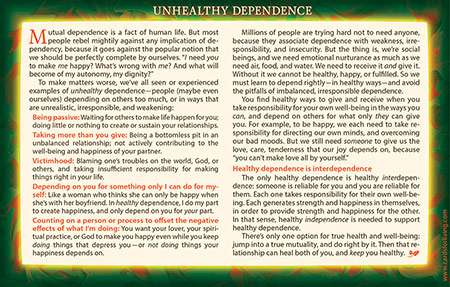Unhealthy dependence
Mutual dependence is a fact of human life. But most people rebel mightily against any implication of dependency, because it goes against the popular notion that we should be perfectly complete by ourselves. “I need you to make me happy? What’s wrong with me? And what will become of my autonomy, my dignity?”
To make matters worse, we’ve all seen or experienced examples of unhealthy dependence — people (maybe even ourselves) depending on others too much, or in ways that are unrealistic, irresponsible, and weakening:
Being passive: Waiting for others to make life happen for you; doing little or nothing to create or sustain your relationships.
Taking more than you give: Being a bottomless pit in an unbalanced relationship; not actively contributing to the well-being and happiness of your partner.
Victimhood: Blaming one’s troubles on the world, God, or others, and taking insufficient responsibility for making things right in your life.
Depending on you for something only I can do for myself: Like a woman who thinks she can only be happy when she’s with her boyfriend. In healthy dependence, I do my part to create happiness, and only depend on you for your part.
Counting on a person or process to offset the negative effects of what I’m doing: You want your lover, your spiritual practice, or God to make you happy even while you keep doing things that depress you — or not doing things your happiness depends on.
Millions of people are trying hard not to need anyone, because they associate dependence with weakness, irresponsibility, and insecurity. But the thing is, we’re social beings, and we need emotional nurturance as much as we need air, food, and water. We need to receive it and give it. Without it we cannot be healthy, happy, or fulfilled. So we must learn to depend rightly—in healthy ways—and avoid the pitfalls of imbalanced, irresponsible dependence.
You find healthy ways to give and receive when you take responsibility for your own well-being in the ways you can, and depend on others for what only they can give you. For example, to be happy, we each need to take responsibility for directing our own minds, and overcoming our bad moods. But we still need someone to give us the love, care, tenderness that our joy depends on, because “you can’t make love all by yourself.”
Healthy dependence is interdependence
The only healthy dependence is healthy interdependence: someone is reliable for you and you are reliable for them. Each one takes responsibility for their own well-being. Each generates strength and happiness in themselves, in order to provide strength and happiness for the other. In that sense, healthy independence is needed to support healthy dependence.
There’s only one option for true health and well-being: jump into a true mutuality, and do right by it. Then that relationship can heal both of you, and keep you healthy.

